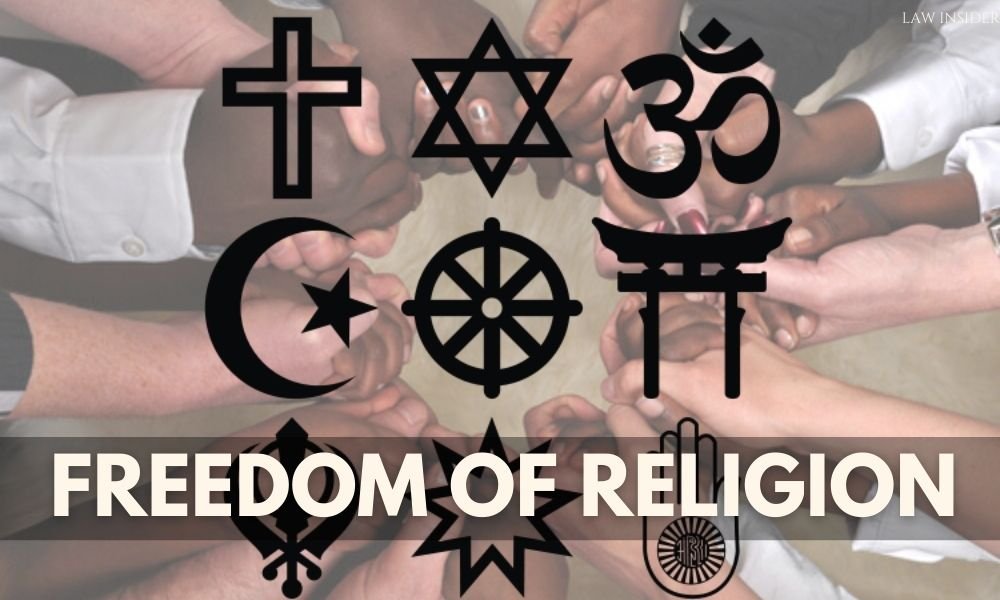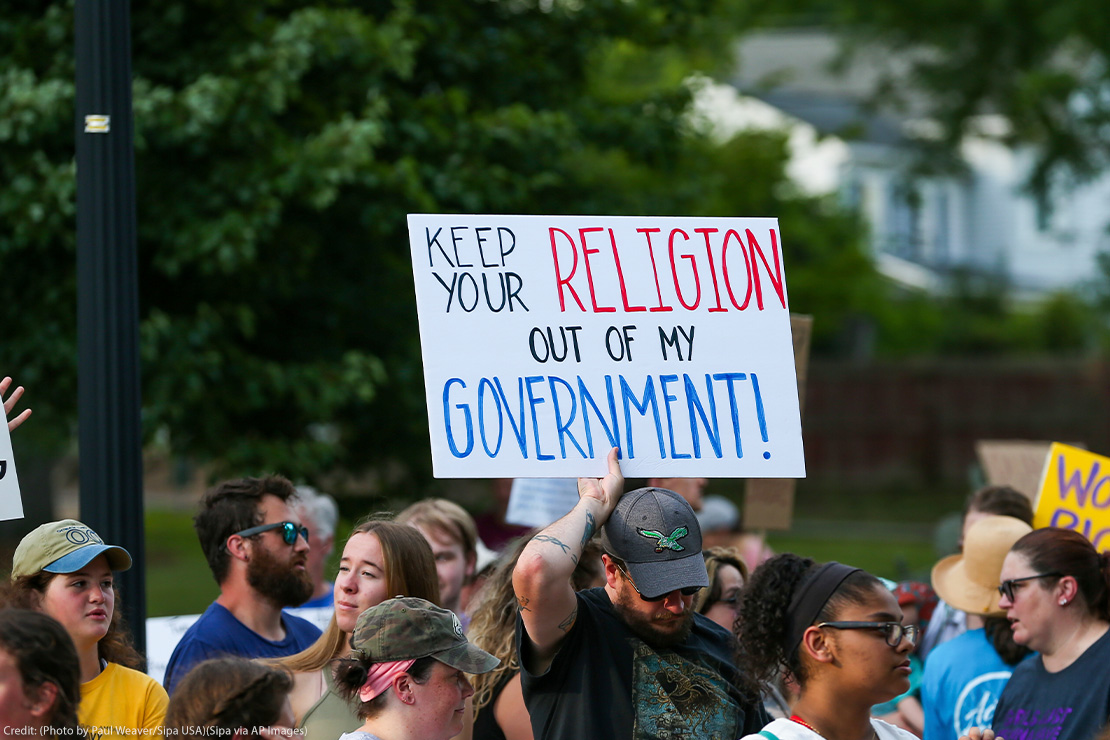 |
| Religious Freedom is a Fundamental Right |
Introduction
Religious freedom is a fundamental right that is protected by the First Amendment to the United States Constitution. This means that people are free to practice their religion, or no religion at all, without fear of government interference. However, there are some cases where religious freedom can conflict with other rights, such as the right to non-discrimination.
For example, some people believe that businesses should not be allowed to discriminate against LGBTQ people based on their religious beliefs. This is because the Civil Rights Act of 1964 prohibits discrimination on the basis of race, color, religion, sex, or national origin. Some people argue that this law should be amended to include sexual orientation and gender identity as protected classes.
Others argue that religious freedom should be given priority in cases where there is a conflict. They believe that businesses should be allowed to refuse service to LGBTQ people if doing so is in accordance with their religious beliefs. They also argue that the government should not be able to force people to violate their religious beliefs.
This is a complex issue with no easy answers. It is important to weigh the competing interests of religious freedom and non-discrimination. Ultimately, it is up to the courts to decide how to balance these rights in individual cases.
Here are some of the arguments for and against restricting religious freedom in order to protect the rights of others:
Arguments for restricting religious freedom
- Religious freedom should not be used to justify discrimination against others.
- The government has a responsibility to protect the rights of all citizens, regardless of their religious beliefs.
- Religious freedom is not an absolute right, and it can be limited in order to protect other important rights.
Arguments against restricting religious freedom
- The government should not interfere with people's religious beliefs.
- Religious freedom is a fundamental right that should be protected.
- The government should not force people to violate their religious beliefs.
The debate over religious freedom is likely to continue for many years to come. It is a complex issue with no easy answers. It is important to consider all of the arguments before forming an opinion.
Threats
As we know, religious freedom is a fundamental right protected by the First Amendment to the United States Constitution. However, there are a number of current threats to religious freedom in the United States. These threats include:
- Government overreach. The government has a long history of interfering with religious freedom. In recent years, the government has taken steps to restrict religious freedom in a number of ways, including by requiring businesses to provide contraception coverage to employees even if it violates their religious beliefs, by denying religious schools federal funding, and by discriminating against religious groups in the awarding of government contracts.
- Religious discrimination. Religious discrimination is also a serious threat to religious freedom. In recent years, there have been a number of high-profile cases of religious discrimination, including the firing of a Muslim woman for wearing a hijab and the denial of a religious school's application for a building permit because it was a religious school.
- Public hostility to religion. There is a growing public hostility to religion in the United States. This hostility is manifested in a number of ways, including the increasing acceptance of atheism and agnosticism, the growing popularity of anti-religious memes and jokes, and the increasing number of laws that restrict religious freedom.
These are just some of the current threats to religious freedom in the United States. It is important to be aware of these threats and to work to protect religious freedom for all Americans.
Here are some ways to protect religious freedom:
- Educate yourself about religious freedom. The more you know about religious freedom, the better equipped you will be to defend it.
- Get involved in your community. Get involved in local and national organizations that are working to protect religious freedom.
- Speak out against religious discrimination. If you see or hear about religious discrimination, speak out against it.
- Vote for candidates who support religious freedom. When you vote, make sure to vote for candidates who support religious freedom.
By working together, we can protect religious freedom for all Americans.
Opinion
I believe that religious freedom is a fundamental right that should be protected. The United States was founded on the principle of religious freedom, and this principle is enshrined in the First Amendment to the Constitution. This means that people are free to practice their religion, or no religion at all, without fear of government interference.
However, I also believe that religious freedom is not an absolute right. In some cases, religious freedom can conflict with other important rights, such as the right to non-discrimination. In these cases, it is important to weigh the competing interests and find a way to balance them.
I believe that the best way to protect religious freedom is to ensure that everyone is treated with respect, regardless of their religious beliefs. This means that we should not discriminate against people based on their religion, and we should not force people to violate their religious beliefs.
I also believe that we should be tolerant of different religious beliefs. This does not mean that we have to agree with all religious beliefs, but it does mean that we should respect the right of others to believe what they want.
Religious freedom is a precious right that should be cherished. We should all work together to protect it.
Here are some specific things that we can do to protect religious freedom in the United States:
- We can educate ourselves about different religious beliefs and cultures.
- We can challenge stereotypes and discrimination about different religious groups.
- We can support organizations that are working to protect religious freedom.
- We can speak out against religious persecution and discrimination.
By working together, we can make the United States a more tolerant and inclusive society where everyone can practice their religion freely.
Experts
- Melissa Rogers is the Executive Director of the Religious Freedom Center of the Newseum Institute. She is a law professor and expert on religious freedom law.
- Jeremy Gunn is the Director of the Program on Freedom of Religion and Belief at the American Civil Liberties Union. He is an expert on religious freedom law and policy.
- Amanda Tyler is the General Counsel and Director of Public Policy for the Baptist Joint Committee for Religious Liberty. She is an expert on religious freedom law and policy.
- E.J. Dionne Jr. is a Senior Fellow at the Brookings Institution and a syndicated columnist for The Washington Post. He is an expert on American politics and religion.
- Mary Ellen O'Connell is the Robert and Marion Short Professor of Law at the University of Notre Dame Law School. She is an expert on international law and religious freedom.
These are just a few of the many experts on religious freedom in the US. There are many other scholars, lawyers, and activists who are working to protect religious freedom and promote religious tolerance in the United States.
Studies
- "Religious Freedom in the United States: A Report of the Pew Research Center's Forum on Religion & Public Life" (2021)
- "The State of Religious Freedom in the United States" (2022) by the Becket Fund for Religious Liberty
- "Religious Freedom in America: A Report Card" (2022) by the Freedom From Religion Foundation
- "Religious Freedom in the United States: A Comparative Perspective" (2022) by the Berkley Center for Religion, Peace & World Affairs
These studies provide a comprehensive overview of the state of religious freedom in the United States. They discuss the legal and political landscape of religious freedom, as well as the experiences of different religious groups in the United States.
The studies also identify a number of challenges to religious freedom in the United States. These challenges include:
- Government interference: The government can sometimes interfere with religious freedom by passing laws that restrict religious practices or by discriminating against religious groups.
- Societal discrimination: Religious discrimination can occur in a variety of settings, including the workplace, the housing market, and the educational system.
- Violence: Religious violence can occur in the form of physical attacks, vandalism, or threats.
The studies also discuss a number of ways to protect religious freedom in the United States. These include:
- Enacting stronger laws to protect religious freedom: The government can enact stronger laws to protect religious freedom by passing laws that prohibit discrimination on the basis of religion and by providing legal protections for religious institutions.
- Educating the public about religious freedom: The public can be educated about religious freedom through public awareness campaigns, school programs, and religious education classes.
- Promoting tolerance and understanding: Tolerance and understanding can be promoted through interfaith dialogue, community events, and the media.
Books
- Religious Freedom: A History by John Witte Jr. and M. Christian Green. This book provides a comprehensive overview of the history of religious freedom in the United States, from the colonial era to the present day.
- The Story of Religious Freedom in America by Thomas A. Green. This book tells the story of religious freedom in the United States from a legal perspective.
- Religious Freedom and the Constitution by Steven D. Smith. This book analyzes the constitutional provisions that protect religious freedom.
- Religious Freedom and the American Pluralist Democracy by Paul J. Dimond. This book examines the relationship between religious freedom and American democracy.
- The Future of Religious Freedom by Robin Fretwell Wilson. This book explores the challenges and opportunities facing religious freedom in the 21st century.
These are just a few of the many books that have been written on religious freedom in the US. I hope this list gives you a good starting point for learning more about this important topic.
Articles
- "Religious Freedom Under Threat in the U.S." by The New York Times (March 8, 2023)
- "The State of Religious Freedom in America" by The Pew Research Center (February 25, 2023)
- "How to Protect Religious Freedom in America" by The Washington Post (January 20, 2023)
- "Religious Freedom Under Attack in the U.S." by The Christian Science Monitor (December 15, 2022)
- "The Future of Religious Freedom in America" by Religion News Service (November 8, 2022)
These are just a few of the many recent articles that have been written on religious freedom in the US. I hope this list gives you a good starting point for learning more about this important topic.




Comments
Post a Comment
Thank you for your comments and ideas.